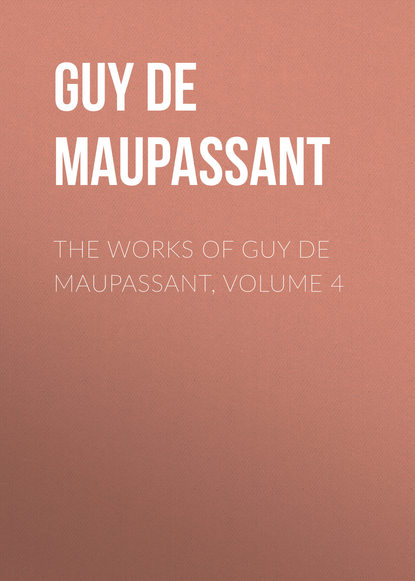По всем вопросам обращайтесь на: info@litportal.ru
(©) 2003-2024.
✖
The Works of Guy de Maupassant, Volume 4
Настройки чтения
Размер шрифта
Высота строк
Поля
"What are you doing? What is the matter?"
An unknown voice answered:
"It is a man who has just drowned himself."
The two ghastly women, squeezing each other tightly, followed the maneuvers of the boat. The music of La Grenonillère continued to sound in the distance, and appeared with its cadences to accompany the movements of the somber fisherman; and the river which now concealed a corpse, whirled round and round, illuminated. The search was prolonged. The horrible suspense made Madeleine shiver all over. At last, after at least half an hour, one of the men announced:
"I have got it."
And he pulled up his long pole very gently, very gently. Then something large appeared upon the surface. The other mariner left his oars, and they both uniting their strength and hauling upon the inert weight, caused it to tumble over into their boat.
Then they made for the land, seeking a place well lighted and low. At the moment when they landed, the women also arrived. The moment she saw him, Madeleine fell back with horror. In the moonlight he already appeared green, with his mouth, his eyes, his nose, his clothes full of slime. His fingers closed and stiff, were hideous. A kind of black and liquid plaster covered his whole body. The face appeared swollen, and from his hair, glued up by the ooze, there ran a stream of dirty water.
"Do you know him?" asked one.
The other, the Croissy ferryman, hesitated:
"Yes, it certainly seems to me that I have seen that head; but you know when like that one cannot recognize anyone easily." And then, suddenly:
"Why, it's Mr. Paul."
"Who is Mr. Paul?" inquired his comrade.
The first answered:
"Why, Mr. Paul Baron, the son of the senator, the little chap who was so amorous."
The other added, philosophically:
"Well, his fun is ended now; it is a pity, all the same, when one is so rich!"
Madeleine sobbed and fell to the ground. Pauline approached the body and asked:
"Is he indeed quite dead?"
"Quite?"
The men shrugged their shoulders.
"Oh! after that length of time for certain."
Then one of them asked:
"Was it at the Grillon that he lodged?"
"Yes," answered the other; "we had better take him back there, there will be something to be made of it."
They embarked again in their boat and set out, moving off slowly on account of the rapid current; and yet, a long time after they were out of sight, from the place where the women remained, the regular splash of the oars in the water could be heard.
Then Pauline took the poor weeping Madeleine in her arms, petted her, embraced her for a long while, consoled her.
"What would you have; it is not your fault, is it? It is impossible to prevent men committing folly. He wished it, so much the worse for him, after all!"
And then lifting her up:
"Come, my dear, come and sleep at the house; it is impossible for you to go back to the Grillon to-night."
And she embraced her again.
"Come, we will cure you," said she.
Madeleine arose, and weeping all the while, but with fainter sobs, her head upon Pauline's shoulder, as though it had found a refuge in a closer and more certain affection, more familiar and more confiding, set off with very slow steps.
THE RABBIT
Old Lecacheur appeared at the door of his house at his usual hour, between five and a quarter past five in the morning, to look after his men who were going to work.
With a red face, only half awake, his right eye open and the left nearly closed, he was buttoning his braces over his fat stomach with some difficulty while he was all the time looking into every corner of the farm-yard with a searching glance. The sun was darting his oblique rays through the beech-trees by the side of the ditch and the apple trees outside, and was making the cocks crow on the dung-hill, and the pigeons coo on the roof. The smell of the cow stalls came through the open door, and mingled in the fresh morning air, with the pungent odor of the stable where the horses were neighing, with their heads turned towards the light.
As soon as his trousers were properly fastened, Lecacheur came out, and went first of all towards the hen-house to count the morning's eggs, for he had been afraid of thefts for some time; but the servant girl ran up to him with lifted arms and cried:
"Master! Master! they have stolen a rabbit during the night."
"A rabbit?"
"Yes, Master, the big gray rabbit, from the hutch on the left;" whereupon the farmer quite opened his left eye, and said, simply:
"I must see that."
And off he went to inspect it. The hutch had been broken open and the rabbit was gone. Then he became thoughtful, closed his right eye again, and scratched his nose, and after a little consideration, he said to the frightened girl, who was standing stupidly before her master:
"Go and fetch the gendarmes; say I expect them as soon as possible."
Lecacheur was mayor of the village, Pairgry-le Gras, and ruled it like a master, on account of his money and position, and as soon as the servant had disappeared in the direction of the village, which was only about five hundred yards off, he went into the house to have his morning coffee and to discuss the matter with his wife, whom he found on her knees in front of the fire, trying to get it to burn up quickly, and as soon as he got to the door, he said:
"Somebody has stolen the gray rabbit."
She turned round so quickly that she found herself sitting on the floor, and looking at her husband with distressed eyes, she said:
"What is it, Cacheux! Somebody has stolen a rabbit?"
"The big gray one."
She sighed.
"How sad! Who can have done it?"
She was a little, thin, active, neat woman, who knew all about farming, and Lecacheur had his own ideas about the matter.

















